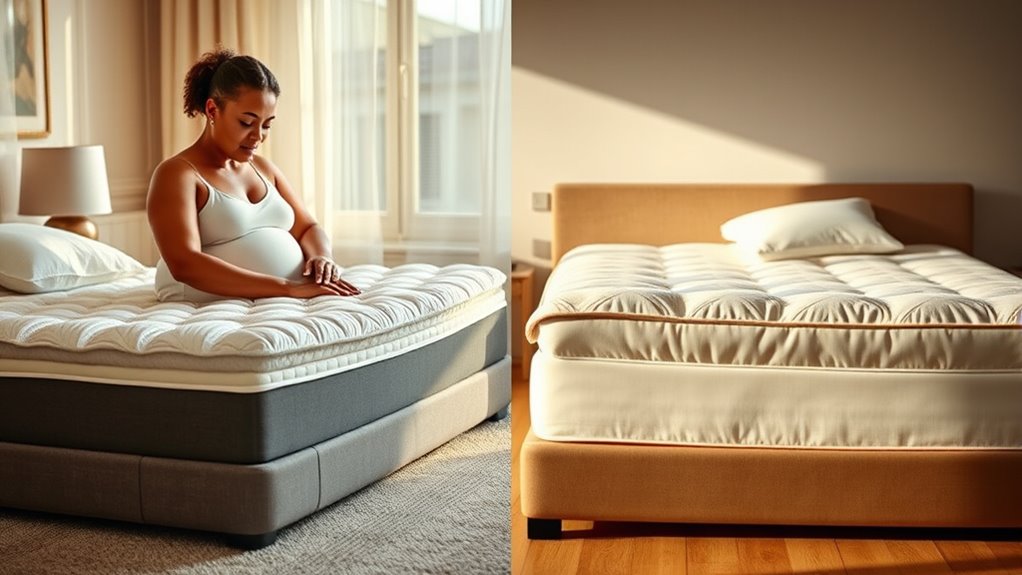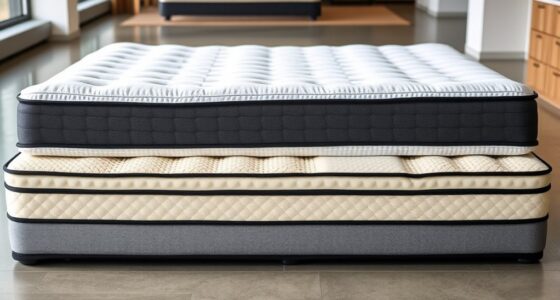Your body weight greatly affects your mattress choice because it influences support, comfort, and durability. If you’re heavier, you’ll need a sturdy mattress with high-density foam or reinforced springs to prevent sagging and ensure proper spinal alignment. Lighter individuals often prefer softer mattresses with good pressure relief. Choosing the right mattress helps distribute your weight evenly, reduces pressure points, and increases longevity. Want to find out how to select the perfect mattress for your weight? Keep exploring for more insights.
Key Takeaways
- Heavier individuals require firmer, high-density mattresses to prevent sagging and ensure proper support.
- Lighter sleepers benefit from softer mattresses that contour for pressure relief and comfort.
- Body weight influences pressure distribution, affecting comfort and the risk of pressure spots.
- Durability is crucial for heavier users; choose high-quality materials to withstand increased pressure.
- Selecting a mattress suited to body weight improves support, prolongs lifespan, and enhances sleep quality.

Your body weight plays a essential role in choosing the right mattress, as it directly affects comfort, support, and durability. When selecting a mattress, understanding how your weight influences pressure distribution is fundamental. Heavier individuals tend to exert more force on the mattress, which can lead to uneven pressure points and discomfort if the mattress isn’t designed to handle such load. Conversely, lighter sleepers might find that softer mattresses offer enough cushioning without sacrificing support. The key is to find a mattress that balances pressure distribution, evenly dispersing your weight to prevent pressure spots that can cause pain or numbness over time.
Your weight influences mattress support, pressure distribution, and durability for better sleep quality.
For heavier sleepers, durability becomes a top concern. Mattresses that aren’t built to withstand increased pressure tend to sag prematurely, losing their supportive qualities and leading to discomfort. Look for models with high-density foam or reinforced innerspring systems, as these materials tend to hold up better under weightier bodies. A mattress with good durability not only maintains its supportive structure longer but also provides consistent pressure distribution, reducing the risk of sinking or indentations that compromise sleep quality. If you’re on the heavier side, investing in a sturdy, high-quality mattress is worth it, as it guarantees you get a restful night without the need for frequent replacements.
Lighter individuals can often opt for softer mattresses, which contour more easily to the body and provide gentle support. Since lighter weight doesn’t exert as much pressure, these mattresses tend to retain their shape longer and are less prone to sagging. Still, it’s important to choose a mattress that offers enough support to keep your spine aligned. Memory foam and latex mattresses are popular options because they conform well and distribute pressure evenly, reducing discomfort. Regardless of your weight, always prioritize a mattress that offers balanced support and pressure relief, ensuring that your sleep remains comfortable and healthy.
Ultimately, your body weight influences how a mattress responds to your movements and how well it supports your body throughout the night. By considering pressure distribution and mattress durability, you can select a product that adapts to your needs, providing comfort and longevity. Proper pressure distribution is essential to prevent pain and improve sleep quality, especially for heavier sleepers. Remember, the right mattress shouldn’t just feel good initially; it should maintain its supportive properties over time, especially if you’re on the heavier side. Investing in the proper support based on your weight means better sleep, fewer aches, and a mattress that stands the test of time.
Frequently Asked Questions
How Does Body Weight Influence Mattress Durability?
Your body weight considerations directly influence mattress durability. Heavier individuals tend to put more pressure on the mattress, leading to faster wear and tear. This can shorten the mattress lifespan if it isn’t designed to support higher weights. To guarantee durability, choose a mattress with reinforced support and high-quality materials. Doing so helps you get the most out of your investment and enjoy a comfortable sleep for years to come.
Are There Specific Mattress Types Recommended for Very Heavy Individuals?
If you’re very heavy, you should look for suitable mattress materials and recommended support systems designed for durability. Memory foam and latex mattresses with reinforced coils offer better support and longevity. You might also consider hybrid mattresses that combine these materials. These options help distribute your weight evenly, prevent sagging, and provide comfort. Always choose mattresses with high-density foam and strong support cores to guarantee they last longer and support your body properly.
Can Body Weight Affect Mattress Warranty Coverage?
Think of mattress warranties like a promise to protect your investment. Your body weight can influence warranty policies because heavier individuals often put more stress on mattresses, potentially affecting mattress longevity. If you’re heavier, you might find that some warranties exclude coverage for sagging or indentations caused by weight. Always read the fine print to understand how your body weight impacts warranty coverage, ensuring your mattress stays protected over time.
Do Weight Fluctuations Impact Mattress Comfort Over Time?
Weight fluctuations can influence your mattress comfort over time. If your weight isn’t stable, it may cause uneven wear, reducing mattress longevity. You might notice some areas sagging or becoming less supportive, which can lead to discomfort. To maintain ideal comfort, consider a mattress designed for durability and weight adaptability, especially if your weight varies frequently. This way, you help guarantee your mattress stays supportive and comfortable longer.
How Does Body Weight Impact Pressure Point Relief?
Your body weight directly affects pressure point relief by influencing pressure distribution and joint pressure. If you’re heavier, your mattress needs to better distribute your weight to prevent excessive pressure on specific areas, like hips or shoulders. Lighter individuals may require less support, but still benefit from mattresses that evenly spread pressure. Choosing the right mattress ensures ideal pressure distribution, reducing joint pressure and enhancing overall comfort for your body’s unique needs.
Conclusion
So, next time you’re choosing a mattress, remember that your body weight isn’t just a number—it’s the secret to a perfect night’s sleep. Ignore it, and you might as well sleep on a pile of rocks. After all, who needs comfort when you can keep guessing and hope for the best? Trust your weight; it’s the only true guide to finding that sweet spot between sinking and support. Sleep well, or suffer the consequences!









